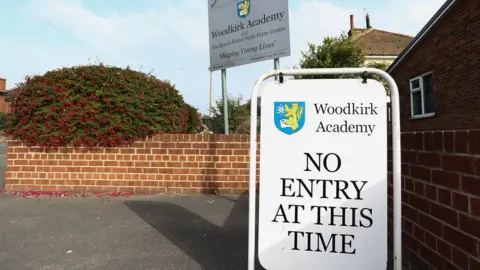Unions say hundreds more schools could have Raac
 EPA
EPAEducation unions say "hundreds more" schools in England could be affected by crumbling concrete than the Department for Education's current list of 147.
It "does not appear to reflect the full extent of the problem" and must be updated "to eliminate misunderstanding of the scale of the problem", they say.
The DfE said the list included only schools where its surveyors had found the concrete as of 30 August.
Those that had confirmed later or had their own surveys were not included.
Used in the construction of schools from the 1950s to the mid-1990s, reinforced autoclaved aerated concrete (Raac) can become "crumbly" over time and prone to collapse.
The general secretaries of the National Education Union, NASUWT, NAHT, GMB, Unison and Unite - which collectively represent teachers, heads and support staff - have written a letter to Education Secretary Gillian Keegan, asking six "urgent questions":
- How many schools at risk of Raac have not had an investigation?
- How many schools suspect they could have Raac?
- How many schools with suspected Raac have yet to be surveyed?
- How long does the government expect it to take for all at-risk schools to be investigated?
- How long does the government think it will take for all schools with suspected Raac to be surveyed?
- What deadline has been set to clear Raac from every school?
Last week, the DfE said Raac had been found in 156 schools, 104 of which had been told to close areas of buildings where the concrete had been found and sufficient safety mitigations were not yet in place.
Nine of the 156 have since been found to contain no Raac.
But previously, Ms Keegan told BBC Radio 4's Today programme the number of affected schools could actually be "hundreds" because 5% - about 1,500 - of schools in England had not yet responded to a DfE questionnaire asking whether they contained Raac.
In their letter to her, the union bosses referenced government figures, published by the National Audit Office in June, showing 196 of 572 schools with suspected Raac had been surveyed and it had been confirmed in 65 of those.
Those numbers have changed considerably as more surveys have taken place over the summer.
BBC News has contacted the DfE for a response.
